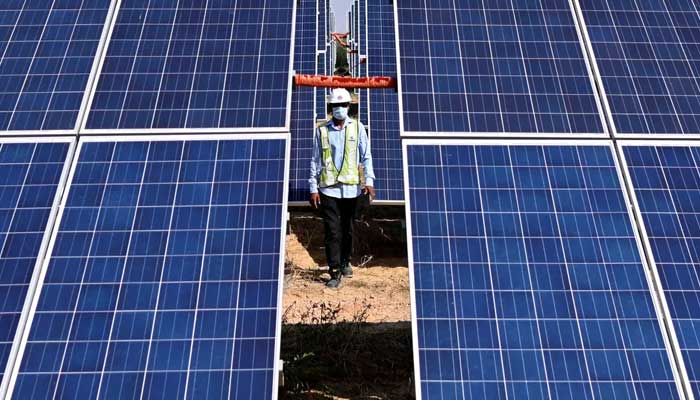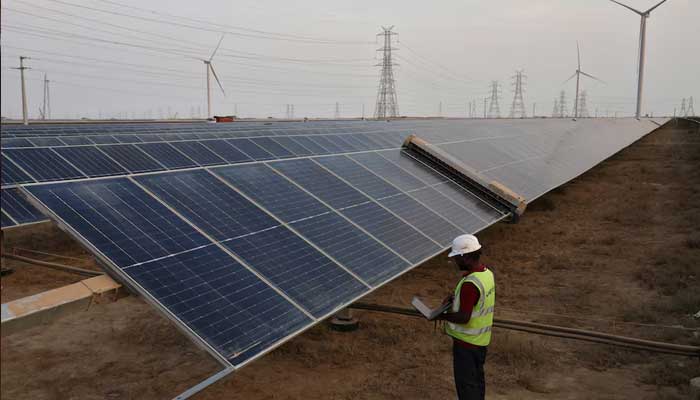
NEW DELHI: Bribery allegations against the founder of India’s Adani Group, Gautam Adani, have exposed the growing problem the country faces in its green energy push in finding buyers for the energy it generates.
Amid New Delhi’s intention to shift from polluting coal power generation to solar and wind power, officials say state government-owned power distribution companies responsible for keeping the lights on have been dragging their feet on renewable energy procurement deals.
The revelation comes amid allegations by US authorities against Adani alleging that the billionaire conspired to devise a $265 million scheme to bribe Indian state government officials to secure solar supply deals after one of his companies was unable to secure buyers for a $6 billion solar project. Several years – a claim denied by the Adani Group.
The group is not alone in facing increasingly long delays in contracting with buyers for renewable electricity now being developed in coal-reliant India, the world’s third-largest emitter of greenhouse gases.
Coal accounted for 75% of India’s power generation in the year to the end of March, with renewables such as solar and wind, but not including hydropower, making up about 12%.
India is still more than 10% short of its much-publicized pledge to add 175 gigawatts of renewable energy by 2022.
This has prompted the federal government to ramp up bidding for renewable energy projects to meet an ambitious 2030 target of increasing their non-fossil fuel capacity to 500 gigawatts.
In the five years to March 2028, it plans to tender for more than four times the capacity of renewable energy projects it commissioned in the previous five years.

To push states to help achieve India’s inclusive goal, New Delhi in 2022 introduced so-called Renewable Purchase Commitments, which commit states to increase clean energy adoption so that the national share doubles to 43.3% in March 2030.
A February report by government think tank NITI Aayog showed that meeting these regional targets would require 20 of the 30 districts under monitoring to more than double the share of green energy in their electricity mix.
The problem is that Indian states are unprepared for the rapid rise in renewable energy generation capacity, lack adequate transmission and storage infrastructure, and prefer to rely on fossil fuels for supply rather than risk “intermittent” renewables.
The challenges were stark in the case of Adani Green – India’s largest renewable energy company – which took nearly three years to conclude supply deals with buyers for the entire 8 gigawatts of solar capacity it won in a highly publicized tender. The largest in the country.
He asks
However, setting targets for tenders and issuing contracts is “meaningless” as long as interest from power distribution companies is very low, says R Srikanth, an energy industry consultant and dean of the National Institute for Advanced Studies in India.
The allegations against Adani are likely to lead to a further slowdown in renewables, as securing low-cost financing from foreign investors may become more difficult, Srikanth said.
A change in the way some tenders are managed has exacerbated delays in the time it takes to complete renewable energy projects.
The tender won by Adani Green was the first major contract issued by the state-run Solar Energy Corporation of India (SECI) without a state-guaranteed power purchase agreement (PPA).
When it was announced in June 2019, SECI said buyers were guaranteed, but it withdrew the clause from the signed deal a year later.
SECI Chairman said Reuters Last month, a tripling of bids for renewable energy projects left 30 GW of projects for which bids were completed but remained without buyers.
“You cannot expect states to respond and start signing triple power supply agreements,” RP Gupta said. Reuters in an interview, adding that “a demand pool must be created” and states must “educate” about renewable energy sources.
Brokerage JM Financial said it now takes 8 to 10 months to sign power supply deals after a contract is awarded.
In comparison, companies awarded contracts between July 2018 and December 2020 needed about three months to conclude supply deals, SECI data showed.
“Sudden spikes in bids, large projects under construction, mismatches in energy demand and bid offers (…) and constraints in timely project implementation are all factors leading to delays in signing,” JM Financial said.
Gupta noted that renewable energy projects also saw cancellations, with about 4% to 5% of all proposed projects cancelled, and a backlog of work in developing transportation infrastructure.
Rakesh Nath, former head of India’s Central Electricity Authority, said one solution is to know how much power buyers want before bidding on projects.
“Gaining buyers’ confidence before calling for bids may reduce delays in signing power supply agreements,” he said.
